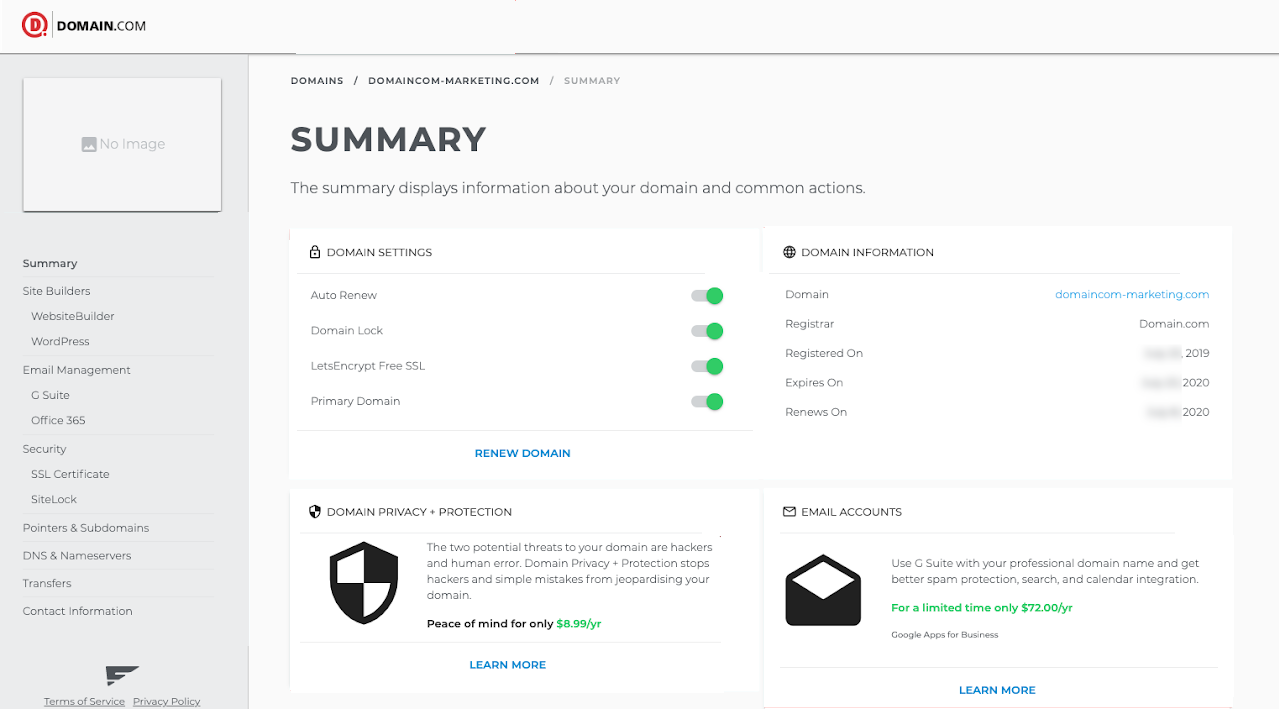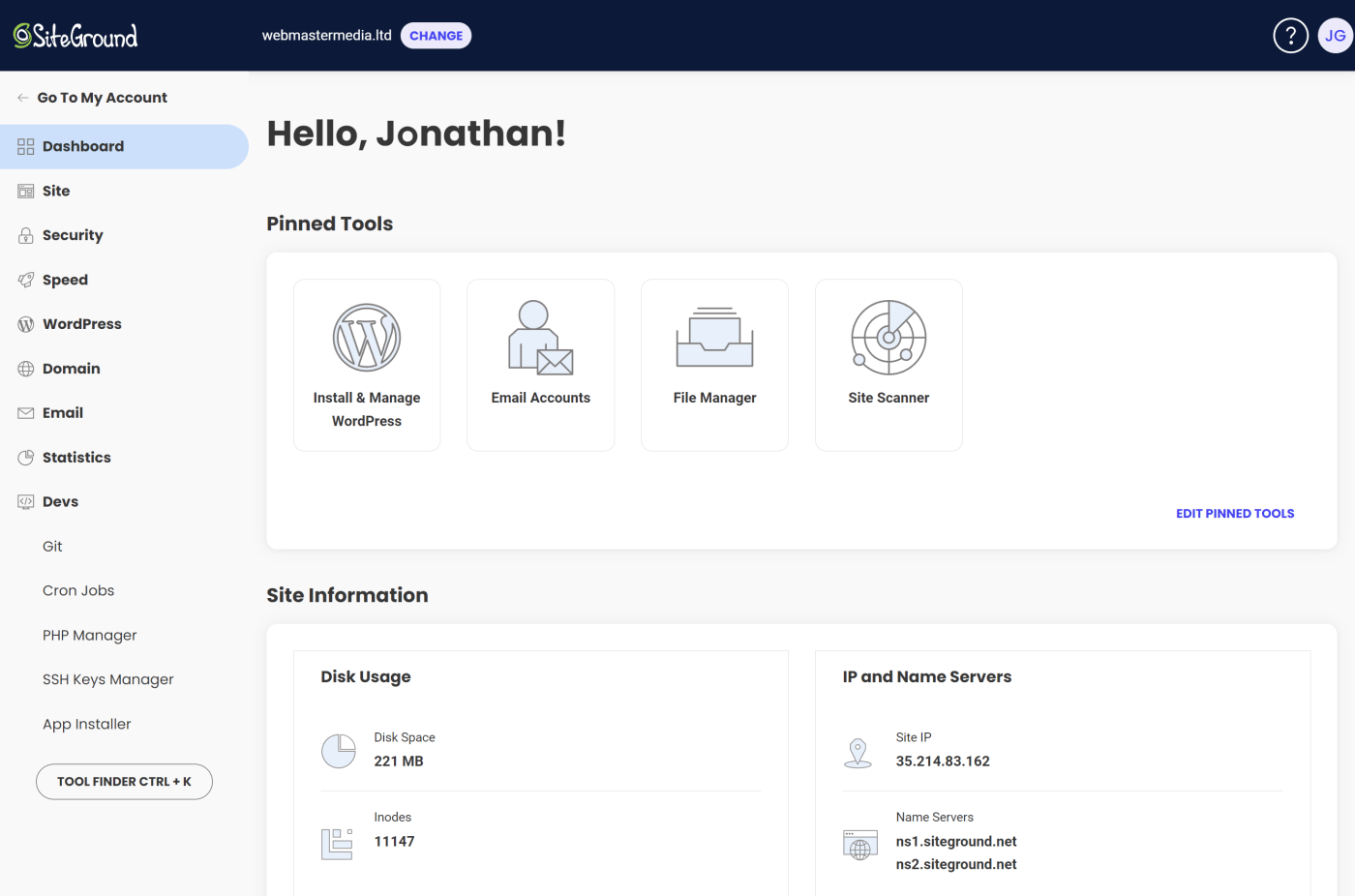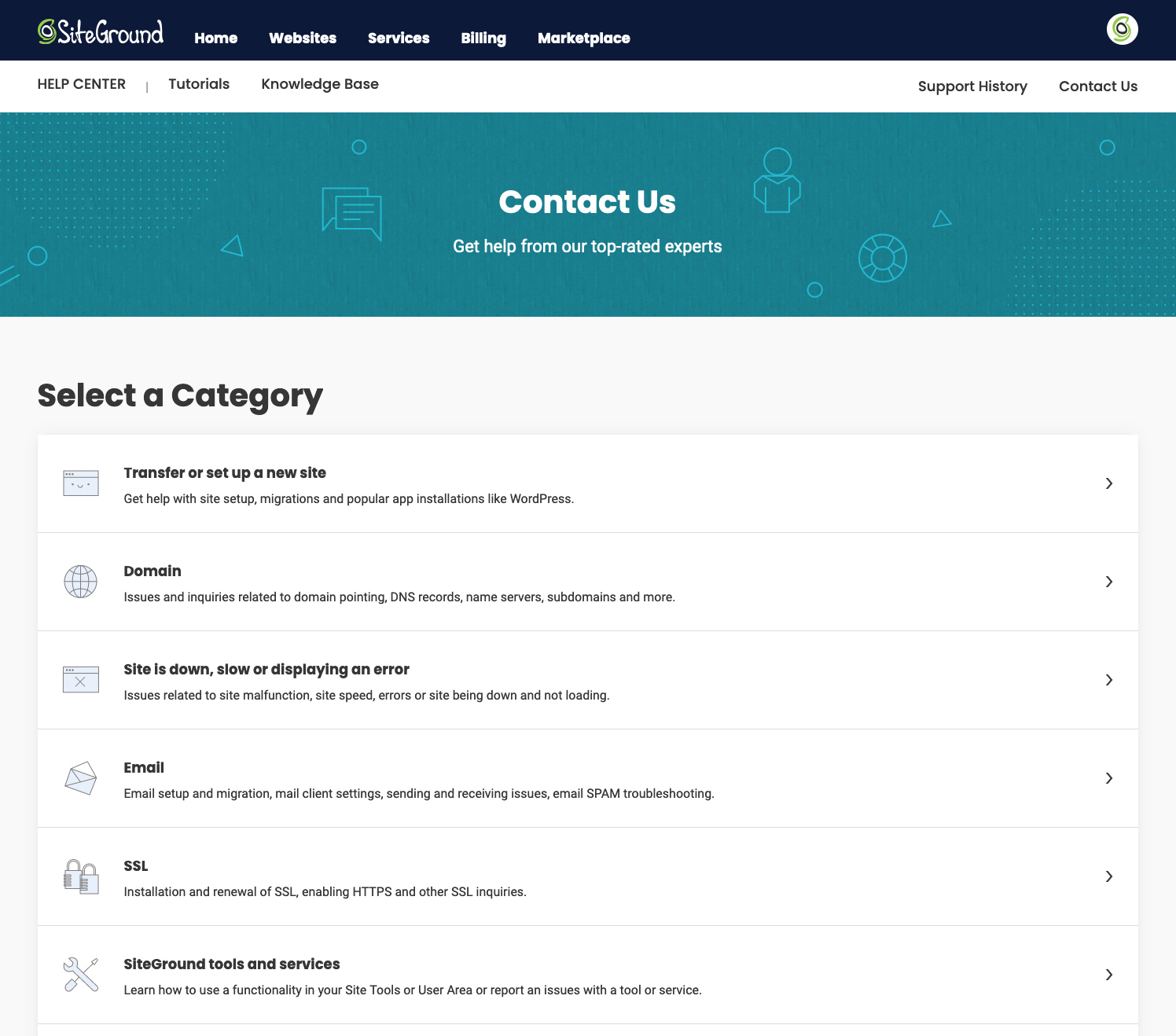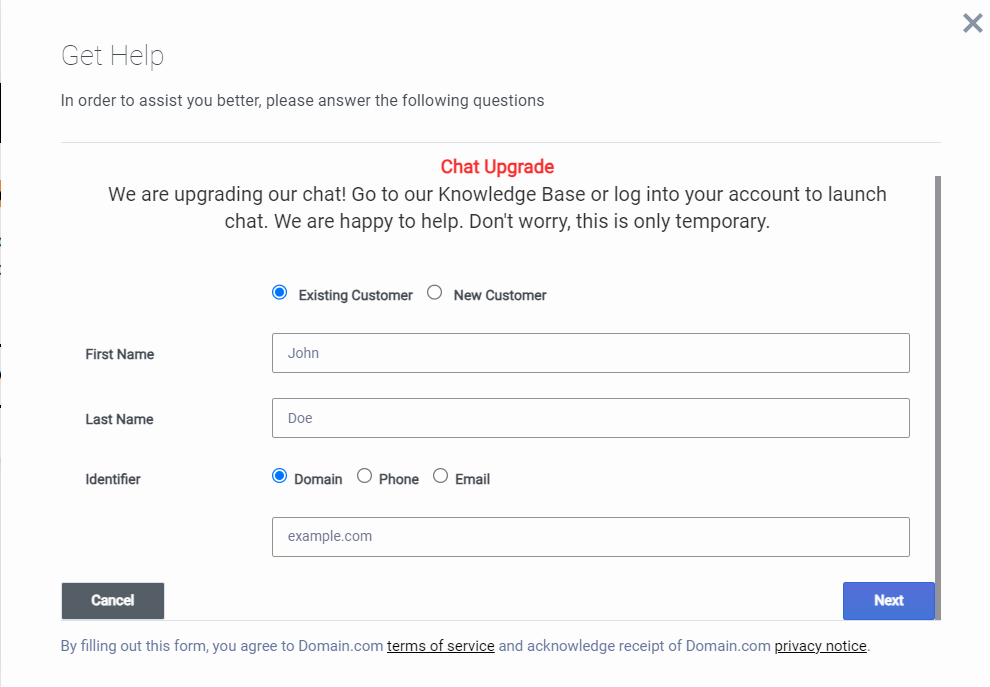Siteground vs Domain.com: Final verdict
Looking over SiteGround vs. Domain.com, both offer distinct features catering to different user needs, but SiteGround generally leads in performance and value.
-
SiteGround (Overall grade: 8.8)
provides robust hosting options such as shared, cloud, WordPress, and ecommerce hosting. It excels in uptime and performance thanks to its Google Cloud infrastructure, advanced caching methods, and free CDN. The hosting service offers a suite of security features like a Smart Web Application Firewall and AI anti-bot protection. SiteGround also has a comprehensive email service, easy migration tools, and a user-friendly custom admin panel with detailed role management. Though renewal prices can be high, the superior reliability, speed, and customer support make it a top choice for various web hosting needs.
Domain.com (Overall grade: 6.5)
offers straightforward shared and WordPress hosting at competitive upfront prices, making it appealing for budget-conscious users. It includes features like a free domain for the first year and a drag-and-drop website builder, providing ease of use for beginners. However, it lacks advanced caching technologies, automatic scaling, and extensive security measures compared to SiteGround. The uptime and response times are also less reliable, and the absence of free migration tools can complicate site transfers. Despite its user-friendly interface and unlimited email accounts, the service falls short in areas like performance and scalability.
 Overall grade:8.8 |
 Overall grade:6.5 |
|
|---|---|---|
| Uptime and Availability | 9.4 | 3.2 |
| Hosting Performance | 8.8 | 5.3 |
| Hosting Security | 8.6 | 7.9 |
| Price | 8.4 | 8.1 |
| Hosting Features | 8.5 | 5.8 |
| Ease Of Setup | 8.9 | 7.7 |
| User Management | 8.4 | 7.2 |
| Customer Support | 9.2 | 7.1 |
| User feedback | 4.3/5 | 3.2/5 |
Hosting types offered
Both platforms provide a variety of hosting types, each designed to meet the different needs of users.
 |
 |
|
|---|---|---|
| Shared hosting | ||
| Cloud hosting | ||
| WordPress hosting | ||
| Ecommerce hosting | ||
| VPS hosting | ||
| Dedicated hosting |
Although both offer a variety of hosting plans tailored to different needs, in
certain cases, one platform may prove to be more suitable.
Detailed comparison
Uptime and availability
Evaluates the average uptime statistics, uptime guarantee and overall availability of the hosting
provider
Score Components:
- Uptime percentage (30%): evaluates the uptime statistics in given period of time
- Uptime guarantee (20%): Assesses if the platform offers an uptime guarantee and
whether the actual uptime matches the promised guarantee. - General performance (25%): Evaluates how fast is the average response time and overall
it’s stability. - Responsiveness (10%): Adaptability to different devices and screen sizes.
- Availability (25%): Reflects the total downtime and number of outages.
 9.4
9.4
 3.2
3.2
Winner SiteGround
🏆 Winner SiteGround: Reliable uptime and impressive response times make it a top choice for hosting.

SiteGround boasts a network uptime guarantee of 99.9%, translating to just 43.83 minutes of potential downtime monthly. In the event of exceeding this downtime, SiteGround offers generous compensation through hosting credits or free months, ensuring users aren’t left without recourse. Real-world tests over nearly two months showed an impressive 99.99% uptime, with minimal downtime and excellent stability. Additionally, the response time of 0.207 seconds highlights SiteGround’s commendable performance.

Domain.com claims a higher uptime guarantee of 99.99%, promising only four minutes and 23 seconds of downtime monthly. Nonetheless, actual tests revealed disappointing results, with uptime ranging from 98% to 99.11%, well below the claimed guarantee. Response times were also notably slower, with averages of 2.97 seconds and 1.591 seconds under load, making it less reliable. While SiteGround excels in uptime and performance, Domain.com falls short.
Which one has better hosting performance?
Score Components:
- Hosting speed (30%): This includes SSD quality, Load times, PageSpeed score ranges,
additional information on website speed, built-in plugins for performance enhancement, available caching
methods, and CPU/RAM options - CDN (20%): Considers whether CDN is available or not, whether it’s free or paid, and
the quality of the CDN service - Available data centers (30%): Evaluates the number of data centers and their locations
globally. - Scalibility (20%): Looks at whether elastic scaling is available, the process required
to scale (manual upgrade vs. automatic scaling), the presence of dedicated servers, and the costs
associated with scaling.
 8.8
8.8
 5.3
5.3
🏆 Winner SiteGround: Superior performance on premium infrastructure.
When comparing the general performance of SiteGround and Domain.com, SiteGround stands out due to its premium Google Cloud infrastructure that ensures top reliability, speedy SSD persistent storage, and low TTFB (time to first byte). SiteGround also incorporates advanced caching methods such as NGINX Direct Delivery and SuperCacher, contributing to faster load times and better PageSpeed scores. Additionally, SiteGround’s offering includes a free CDN with a vast 170+ edge network, enhancing performance globally. In contrast, Domain.com does not include any CDN, and its performance relies on a basic setup without advanced caching or infrastructure technologies. Both providers promise 24/7 support, but SiteGround’s higher customer satisfaction rate reinforces its reliability.
Website Speed
SiteGround’s custom implementation of PHP and MySQL, coupled with preinstalled speed optimization plugins, significantly enhances website speed. Their caching methods, like static and dynamic caching, can make pages load up to 5x faster. Domain.com, while providing unlimited bandwidth and steady uptime, does not offer these advanced speed technologies, making SiteGround a clear winner in terms of website speed and load times.
Scalability
SiteGround offers various scalable plans, including cloud hosting options starting at $100/month. SiteGround’s cloud hosting automatically adjusts resources based on traffic, ensuring seamless scaling. It also provides automated daily backups and a one-click staging tool for added flexibility. On the other hand, Domain.com lacks detailed information on automatic scaling and dedicated server options. With no specifics on their scalability processes, it’s unclear how well Domain.com can handle significant traffic surges or scaling needs.
Which one has better security features?
and regulatory requirements
Score Components:
- Technical security measures (40%): This includes encryption, firewalls, DDoS
protection, secure configurations, server monitoring, access control and availability of security addons
(e.g Sitelock security). - Operational security measures (30%): Encompasses data privacy, backups and data
redundancy. - Compliance and certifications (20%): Adherence to legal and regulatory requirements
(e.g., GDPR, HIPAA) and possession of certifications (e.g., ISO 27001, SOC 2). - Business and reliability (10%): Factors in the provider’s reputation, uptime
guarantees, and customer support.
 8.6
8.6
 7.9
7.9
🏆 Winner SiteGround: Offers enhanced security features and automatic updates to keep your site secure.
Both SiteGround and Domain.com, have notable differences in their approaches to technical and operational security, as well as in their compliance with regulations.
Technical security measures:
SiteGround features a custom Smart Web Application Firewall (WAF) that is regularly updated to protect against various threats. It also boasts an AI-based anti-bot system that blocks millions of security threats daily. Domain.com provides multiple SSL certificate options with a significant range of warranties and ensures encryption, authentication, and credit card protection. While Domain.com offers malware protection and automatic removal, these are not as robust as SiteGround’s custom and multi-layered security solutions managed by Google Cloud.
Operational security measures:
SiteGround provides 24/7 system administration and daily backups, storing up to 30 copies with easy restore options. Automatic updates for WordPress and WooCommerce enhance its operational security. Domain.com offers 24/7 support and includes SiteLock security features like blacklist monitoring and DDoS protection in higher-tier plans. Though effective, Domain.com’s operational measures are not as comprehensive as SiteGround’s AI anti-bot system and custom security updates.
Compliance and certifications:
SiteGround does not specify GDPR compliance but offers robust data protection through its secure Google Cloud infrastructure. Domain.com is GDPR compliant, offering extensive data protection for EU residents including rights of access and rectification. Both services ensure SSL certificates for PCI compliance, but SiteGround explicitly states it does not offer PCI compliant servers.
 |
 |
|
|---|---|---|
SSL certificate |
Free SSL certificates |
Multiple SSL options |
Additional security features |
AI anti-bot, WAF |
SiteLock, DDoS protection |
PHP versions |
Not specified |
Not specified |
GDPR compliance |
Not specified |
Compliant |
HIPAA compliance |
Not specified |
Not specified |
PCI compliance |
Not compliant |
Compliant |
Hosting features
Score Components:
- Domains (20%): Assesses the availability of a free domain, domain purchase options, and
pricing - Email (15%): Considers if the provider offers full email hosting, or is reselling
third-party service, and if the email is only transactional or not - Website builder (15%): Checks if website builder is available, and it’s user
friendliness and overall the level of customization allowed. - Staging environment (20%): Determines if a staging environment is available, allowing
for testing changes before going live. - FTP & SFTP accounts (10%): Evaluates if and how easily users can access FTP and
SFTP accounts - Git and SSH access (20%): Assess whether Git is integrated into the hosting service and
if SSH access is provided
 8.5
8.5
 5.8
5.8
🏆 Winner SiteGround: A comprehensive hosting solution with advanced features and user-friendly tools perfect for managing various types of websites.
SiteGround and Domain.com both offer a robust suite of features designed to meet different hosting needs. SiteGround excels particularly in providing optimized WordPress hosting with out-of-the-box caching, enhanced security measures, and a broad range of managed services. Users benefit from their 24/7 expert support and a user-friendly interface that includes a free site builder, daily backups, and a free CDN service. Notably, SiteGround’s GoGeek plan offers extensive resources like unlimited websites and web space, which is well-suited for high-traffic sites and professional developers. Conversely, Domain.com focuses on flexibility and ease of use, highlighted by its drag-and-drop website builder and comprehensive WordPress hosting package that includes curated themes and pre-installed plugins.
One key differentiator is the domain registration policy; Domain.com provides a free domain for the first year with a promo code, possibly lowering initial costs for new users. Furthermore, the additional availability of SSH and staging environments in SiteGround brings it ahead for users requiring advanced technical capabilities. SiteGround also offers a higher level of customization with features like WP-CLI access and on-demand backup copies, attracting users who are looking for finer control over their websites. While Domain.com also provides unlimited bandwidth and storage, making it an appealing choice for growing websites, it lacks some of the more advanced tools and backup options that SiteGround offers, which are crucial for larger or more complex sites.
 |
 |
|
|---|---|---|
Free Domain |
No |
Yes, for the first year |
Free SSL |
Yes |
Yes, for the first year |
Email Hosting |
Yes |
Yes |
Website Builder |
Yes |
Yes |
Staging Environment |
Yes |
No |
FTP & SFTP Accounts |
Yes |
Yes |
Git and SSH Access |
Yes |
No |
Free Backup |
Yes |
No |
Money Back Guarantee |
Yes, 30 days |
No |
a location.
As a result in rare cases the features mentioned here can differ from the ones you see on their websites.
Both providers support a range of users from beginners to experts with user-friendly website builders and WordPress staging areas. However, in terms of developer tools, both SiteGround and Domain.com offer robust options including SSH access, support for multiple programming languages, and Git for version control, thus appealing to developers looking for advanced capabilities.
Email services:
SiteGround provides comprehensive email hosting services, allowing users to set up their own email accounts and manage campaigns directly. In addition, their robust email capabilities ensure seamless communication. Domain.com also offers email hosting services, including unlimited email accounts, making it easy for users to manage their correspondence. Both platforms provide essential email functionalities, but SiteGround’s enhanced security features add an extra layer of reliability for transactional email needs.
Price
Score Components:
- Plan value (40%): What each pricing tier offers.
- Transparency and clarity (30%): Clearness of pricing structures.
- Flexibility of plans (20%): Range of options to suit different budgets.
- Hidden costs (10%): Additional expenses not included in the plan.
 8.4
8.4
 8.1
8.1
🏆 Winner SiteGround: Exceptional versatility and an array of feature-rich plans tailored for any need.
Evaluating the pricing of plans among various hosting providers can be complex due to their differing pricing and renewal strategies. Additionally, certain plans require annual commitments, which adds to the difficulty of making comparisons. The prices listed are based on monthly commitments; plans requiring annual commitments are indicated. Additionally, although some providers offer identical plans for WordPress and shared hosting, we have created separate tables for each to enhance clarity.
When comparing SiteGround and Domain.com, we observe that SiteGround offers a diverse range of WordPress, shared, and cloud hosting plans with competitive introductory prices and a comprehensive set of features. SiteGround’s plans include significant add-ons such as enhanced security features, daily backups, and free email services, justifying its price points across different tiers. On the other hand, Domain.com provides straightforward pricing with consistent rates across various billing cycles, making it potentially more budget-friendly upfront. However, their additional resources and features, such as SSL certificates and domain names, often come with time-limited offers or are restricted to higher-tier plans.
 |
 |
|---|---|
|
StartUp Plan $17.99/mo
1 Website, 10 GB Web Space, Unmetered Traffic, Free WP Installation, WP Autoupdates, Free SSL, Daily Backup, Free CDN, Free Email, Enhanced Security, Ecommerce Enabled, WP-CLI and SSH, Managed WordPress, Unlimited Databases Value for price:7.8
|
Basic Plan $3.75/mo
1 Website, 10 GB Web Storage, Unmetered Bandwidth, Free Domain for the first year, Free SSL for the first year Value for price:6.5
|
|
GrowBig Plan $29.99/mo
Unlimited Websites, 20 GB Web Space, Unmetered Traffic, Free WP Installation, WP Autoupdates, Free SSL, Daily Backup, Free CDN, Free Email, Enhanced Security, Ecommerce Enabled, WP-CLI and SSH, 30% faster PHP, Staging Value for price:8.3
|
Plus Plan $3.75/mo
5 Websites, 20 GB Web Storage, Unmetered Bandwidth, Free Domain for the first year, SSL Certificate included Value for price:7.2
|
|
GoGeek Plan $44.99/mo
Unlimited Websites, 40 GB Web Space, Unmetered Traffic, Free WP Installation, WP Autoupdates, Free SSL, Daily Backup, Free CDN, Free Email, Enhanced Security, Ecommerce Enabled, WP-CLI and SSH, White-label Clients, Free Private DNS, Highest Tier of Resources, Priority Support Value for price:8.9
|
Premium Plan $3.75/mo
10 Websites, 40 GB Web Storage, Unmetered Bandwidth, Free Domain for the first year, SSL Certificate included Value for price:7.5
|
 |
 |
|---|---|
|
StartUp Plan $17.99/mo
1 Website, 10 GB Web Space, Unmetered Traffic, Free SSL, Daily Backup, Free CDN, Free Email, Enhanced Security, Ecommerce Enabled, Managed WordPress, Unlimited Databases Value for price:8.0
|
Basic Plan $3.75/mo
1 Website, 10 GB Web Storage, 15K Visitors, Unmetered Bandwidth, Drag-and-drop builder, Free Domain for the first year, Free SSL for the first year Value for price:7.0
|
|
GrowBig Plan $29.99/mo
Unlimited Websites, 20 GB Web Space, Unmetered Traffic, Free SSL, Daily Backup, Free CDN, Free Email, Enhanced Security, Ecommerce Enabled, Managed WordPress, 30% faster PHP, Staging Value for price:8.4
|
Plus Plan $3.75/mo
5 Websites, 20 GB Web Storage, 50K Visitors, Unmetered Bandwidth, Drag-and-drop builder, Free Domain for the first year, SSL Certificate included Value for price:7.4
|
|
GoGeek Plan $44.99/mo
Unlimited Websites, 40 GB Web Space, Unmetered Traffic, Free SSL, Daily Backup, Free CDN, Free Email, Enhanced Security, Ecommerce Enabled, Managed WordPress, White-label Clients, Free Private DNS, Highest Tier of Resources, Priority Support Value for price:8.8
|
Premium Plan $3.75/mo
10 Websites, 40 GB Web Storage, 200K Visitors, Unmetered Bandwidth, Drag-and-drop builder, Free Domain for the first year, SSL Certificate included Value for price:7.7
|
 |
 |
|---|---|
|
Jump Start Plan $100.00/mo
4 CPU Cores, 8GB Memory, 40GB SSD Space, 5TB Data Transfer Value for price:8.2
|
N/A |
|
Business Plan $200.00/mo
8 CPU Cores, 12GB Memory, 80GB SSD Space, 5TB Data Transfer Value for price:8.5
|
N/A |
|
Business Plus Plan $300.00/mo
12 CPU Cores, 16GB Memory, 120GB SSD Space, 5TB Data Transfer Value for price:8.7
|
N/A |
|
Super Power Plan $400.00/mo
16 CPU Cores, 20GB Memory, 160GB SSD Space, 5TB Data Transfer Value for price:8.9
|
N/A |
Enterprise plans
For enterprises, SiteGround offers highly flexible cloud hosting plans with extensive resources, priority support, and advanced security features, making it a strong choice for larger businesses. Domain.com does not provide specific plans tailored for larger enterprise needs, thereby limiting its appeal for extensive and scalable solutions. Overall, SiteGround stands out for enterprise-level hosting with its comprehensive and highly adaptable plans.
Siteground vs Domain.com: Ease of setup
platform.
Score Components:
- Site migration (25%): Assesses whether the provider offers tools for site migration,
either automated or manual, and whether these services are free or require a fee. - Admin panel usability (35%): Evaluates the type of admin panel provided, such as the
standard cPanel or a custom solution, focusing on its accessibility and user-friendliness for both
technical and non-technical users. - Setup features (20%): Examines the availability and ease of use of various setup
features, including FTP accounts, file managers, email account setup, PHPMyAdmin, and easy CDN
configuration. - Help center quality (20%): Measures the quality and accessibility of the provider’s
help center resources, including articles and tutorials.
 8.9
8.9
 7.7
7.7
🏆 Winner SiteGround: A feature-rich and user-friendly hosting provider known for its excellent support and quick setups.
SiteGround uses an intuitive custom admin panel that simplifies management tasks for both technical and non-technical users. This panel includes easy access to essential tools like the automated site setup wizard, one-click staging tools, and WordPress-specific features. SiteGround’s interface is clean and well-organized, with pinned help articles and automated solutions to enhance user experience. Conversely, Domain.com offers a more standardized control panel that incorporates a straightforward website builder and Google Workspace integration to aid in site setup. While Domain.com’s panel is user-friendly, it may not offer the same level of depth in specialized tools as SiteGround’s custom solution.

Both SiteGround and Domain.com provide user-friendly experiences, but SiteGround’s admin panel stands out due to its additional specialized tools and pinned help articles. Domain.com’s approach relies heavily on the ease of its drag-and-drop website builder and AI-powered setup, which are great for beginners but may lack the advanced capabilities some users need. Overall, SiteGround’s custom panel is designed to cater to both novices and seasoned web managers, while Domain.com’s panel leans towards simplicity and straightforward usability.

SiteGround offers free and easy migration tools such as the WordPress Migrator Plugin, which allows users to transfer their sites without additional cost. For more complex migrations, professional expert migrations are available for a fee of $30. Domain.com does not specify free migration tools, meaning users might need to handle transfers manually or use external services, which can be more complicated and potentially costly. As such, SiteGround’s migration options provide more flexibility and user-friendliness.
The platforms provide extensive knowledge bases filled with guides, how-to articles, and instructional content. SiteGround offers a wide range of resources alongside 24/7 chat and phone support. Domain.com also boasts a detailed help center with an intuitive search function and around-the-clock support via live chat, phone, and ticketing, ensuring comprehensive user support.
User management
accessibility.
Score Components:
- Role customization (40%): Flexibility in creating and defining user roles and
permissions. - Ease of management (30%): User interface and tools for managing users.
- Access control (20%): Effectiveness of access control measures for different user
levels. - Scalability (10%): Ability to manage a growing number of users efficiently.
 8.4
8.4
 7.2
7.2
🏆 Winner SiteGround: Offers a comprehensive set of user management features making it suitable for collaborative and client-based projects.
SiteGround outperforms Domain.com in managing user roles, permissions, and accessibility. SiteGround allows detailed customization to add team members as collaborators for one or numerous sites and offers white-label access for clients on specific plans. You can create, manage, and assign roles, tailoring access based on specific needs. Domain.com offers predefined WordPress roles such as Administrator, Editor, Author, Contributor, and Subscriber. While these roles cover basic needs, SiteGround’s ability to create custom roles provides significantly more flexibility.
The user interface for managing users in SiteGround is accessible through the Client Area, making it straightforward to navigate and manage roles and permissions. Users can quickly add collaborators, create new roles, and assign these roles directly from a centralized location. Domain.com uses the WordPress Dashboard for user management. Users can add and assign predefined roles through a familiar WordPress interface, but it lacks the customization offered by SiteGround.
SiteGround’s access control measures are highly effective, particularly with white-label clients who receive unbranded access to Site Tools. This feature is beneficial for managing numerous client sites efficiently. The ability to create custom roles also ensures that the correct permissions are always in place. Domain.com’s predefined WordPress roles are adequate for smaller sites or single-user blogs but may struggle with scalability in more complex environments.
SiteGround user roles table:
| Role | Description | Access highlights |
|---|---|---|
| Collaborator | Team members who can build or maintain the site. | Access to Site Tools specific to the assigned site, individual login credentials. |
| White-label Client | Clients with access to their sites without seeing SiteGround branding. | Unbranded access to Site Tools; can build or maintain the site as needed. |
Customer support
hosting provider.
Score Components:
- Support communication channels (30%): Measures the variety of customer support types
provided (live chat, chatbot, email, phone, etc.) - Availability (20%): Assesses the availability hours for each channel, including 24/7
support options. - Technical support quality (30%): Assesses whether the provider offers comprehensive
technical support, including hardware upgrades (e.g., HDD to SSD), software installations, and web
server configuration changes. - Enterprise support (20%): Checks if there are dedicated or priority support services
for enterprise-level customers.
 9.2
9.2
 7.1
7.1
🏆 Winner
SiteGround: Offers extensive and responsive customer support options.
 |
 |
|
|---|---|---|
Phone support |
||
Live chat support |
||
Chatbot |
||
Email/ticket support |
||
Enterprise support |

SiteGround shines with its multi-faceted customer support. It boasts 24/7 availability across live chat, phone support, and email/ticket systems, ensuring help is always accessible. Their dedicated help center includes automated solutions, pinned help for immediate answers, and a knowledge base with extensive resources. Priority support adds another layer for those on the highest-tier plan. The AI assistant trained with ChatGPT further enhances the user experience by providing instant responses to common questions.

Domain.com also offers 24/7 support via phone and live chat, promising quick connection times. While Domain.com includes a knowledge base with detailed guides and tutorials, it lacks dedicated email/ticket support and enterprise-level support options. User feedback suggests a mixed experience, with some praising the responsiveness and others encountering delays. Overall, while functional, Domain.com’s customer service offerings fall short compared to SiteGround’s comprehensive support system.
Siteground vs Domain.com: User feedback
SiteGround garners consistently high praise for its exceptional customer support and user-friendly tools, frequently being described as reliable and straightforward to use. Users commend the fast and knowledgeable technical assistance, which is available through various channels like chat and phone, often highlighting the effectiveness and patience of support representatives. Despite these positive aspects, some users find renewal pricing relatively expensive and note that navigating to the support section can be cumbersome. Issues with specific features, such as webmail interface and certain plugins, are also mentioned, but overall, SiteGround is recommended for its strong support and ease of use, especially for beginners and small businesses.
User feedback for this hosting provider reveals a mixed experience. Many users appreciate its user-friendly platform, straightforward domain registration process, and reliable customer support. However, significant criticisms include poor customer service practices, confusing pricing and add-ons, and outdated or slow web interfaces. While some users praise the affordability and efficiency of domain management, others warn of hidden costs and problematic service.
Siteground vs Domain.com: FAQ
Which platform is better suited for hosting WordPress websites?
SiteGround is generally better suited for hosting WordPress websites, offering extensive WordPress features like WP-CLI, staging, and auto-updates. It also provides enhanced security, free SSL, and managed WordPress hosting, making it ideal for both beginners and advanced users. Domain.com offers WordPress hosting as well but lacks some of the advanced features and performance optimizations that SiteGround provides.
Are both platforms suitable for beginners?
Both SiteGround and Domain.com are suitable for beginners. SiteGround offers easy migration tools, a user-friendly custom admin panel, and comprehensive email hosting, making it easy for new users to get started. Domain.com provides a drag-and-drop website builder and competitive upfront prices, which are appealing for budget-conscious beginners.
Which hosting service offers better security features?
SiteGround offers better security features with its custom Smart Web Application Firewall (WAF), AI anti-bot system, and advanced caching methods. Domain.com provides multiple SSL certificate options and includes SiteLock security features like DDoS protection in higher-tier plans, but these are not as robust as SiteGround’s multi-layered security solutions managed by Google Cloud.
Which platform offers better customer support?
SiteGround offers better customer support with 24/7 availability through live chat, phone, and email/ticket systems, as well as an AI assistant trained with ChatGPT for instant responses. Domain.com also provides 24/7 support via phone and live chat but lacks dedicated email/ticket support and enterprise-level support options, making SiteGround’s customer service more comprehensive.
Which hosting service offers more scalability options for growing websites?
SiteGround offers more scalability options with various scalable plans, including cloud hosting starting at $100/month that automatically adjusts resources based on traffic. They also provide automated daily backups and a one-click staging tool for added flexibility. Domain.com lacks detailed information on automatic scaling, making SiteGround a better choice for growing websites.
The making of this blog
We followed a clear, step-by-step process to write and research this article.








